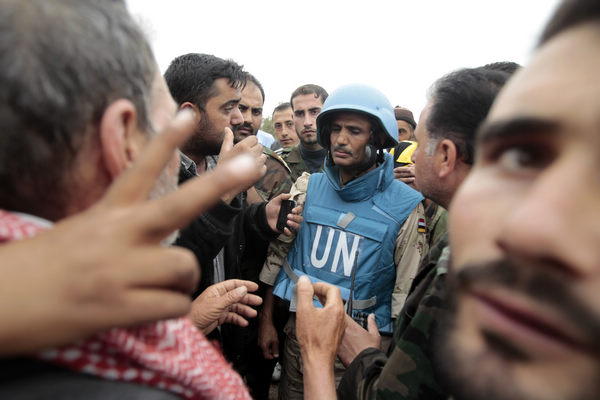A scarred city with the wounds of war
Updated: 2012-05-17 07:46
By Li Lianxing (China Daily)
|
||||||||
Syria's third largest city, Homs, used to attract large numbers of tourists, keen to see its mixed Christian and Islamic heritage and peaceful co-existence. Now, an exodus by the local population has replaced commercial activities, tourism and anything approaching a normal life.
A police patrol joined our motorcade as we entered the city, and when we requested to go to the Baba Amr district, the scene of fiercest fighting during the preceding months, another group of heavily armed security guards was ordered to go with us. Although we didn't hear any gunshots or explosions, the situation appeared much more sensitive and dangerous than we had expected.
 |
|
Anti-regime protestors talk to a UN observer in the village of Azzara in Homs on May 4. Syria's parliamentary polls on May 7, against a backdrop of unrest. |
The scene that met our eyes once we had passed through the checkpoint into Baba Amr was one of utter devastation. The streets and alleyways were empty and desolate, and standing in the noiseless street, I was overwhelmed by the 30 C heat and the sights in front of me.
What I saw emphasized not only how fierce the battles have been, but also how daunting life must be for the people of the area. Not one of the houses or commercial buildings was untouched, every window of every room was shattered, the vaults of mosques displayed huge shell holes, and auto wrecks and garbage carpeted the roads. This is already a ghost city.
"Look." One of our guards pointed at a ruined house, its walls pockmarked by countless bullets holes. "This place was used for food distribution and now it's just rubble," he said.
However, people are still living among the debris, but their appearances on the streets are few and far between. The cease-fire agreement did prevent the escalation of violence but small-scale skirmishes still pose a threat to civilians, especially as the night raids against forces loyal to the Syrian government have increased, according to the governor of Homs, Ghassan Abdelaal.
He said a lack of leadership among the opposition groups and what he described as the "dual identity" of their fighters prevented them from gaining total control of this area. "They are civilians in the daytime and become militants when they take up arms at night," he said. "We don't want to kill any civilians, and we are still under pressure from Western countries."

 Relief reaches isolated village
Relief reaches isolated village
 Rainfall poses new threats to quake-hit region
Rainfall poses new threats to quake-hit region
 Funerals begin for Boston bombing victims
Funerals begin for Boston bombing victims
 Quake takeaway from China's Air Force
Quake takeaway from China's Air Force
 Obama celebrates young inventors at science fair
Obama celebrates young inventors at science fair
 Earth Day marked around the world
Earth Day marked around the world
 Volunteer team helping students find sense of normalcy
Volunteer team helping students find sense of normalcy
 Ethnic groups quick to join rescue efforts
Ethnic groups quick to join rescue efforts
Most Viewed
Editor's Picks

|

|

|

|

|

|
Today's Top News
Health new priority for quake zone
Xi meets US top military officer
Japan's boats driven out of Diaoyu
China mulls online shopping legislation
Bird flu death toll rises to 22
Putin appoints new ambassador to China
Japanese ships blocked from Diaoyu Islands
Inspired by Guan, more Chinese pick up golf
US Weekly

|

|






